Featured Posts

- Index of Psychological Studies of Presidents and Other Leaders Conducted at the Unit for the Study of Personality in Politics
- The Personality Profile of U.S. Supreme Court Associate Justice Brett Kavanaugh
- The Leadership Style of North Korean Leader Kim Jong-un
- North Korea Threat Assessment: The Psychological Profile of Kim Jong-un
- Russia Threat Assessment: Psychological Profile of Vladimir Putin
- The Personality Profile of 2016 Republican Presidential Candidate Donald Trump
- Donald Trump's Narcissism Is Not the Main Issue
- New Website on the Psychology of Politics
- Unit for the Study of Personality in Politics --- 'Media Tipsheet'
categories

- Afghanistan (228)
- Al Gore (2)
- Amy Klobuchar (4)
- Ayman al-Zawahiri (7)
- Barack Obama (60)
- Ben Carson (2)
- Bernie Sanders (7)
- Beto O'Rourke (3)
- Bill Clinton (4)
- Bob Dole (2)
- Campaign log (109)
- Chris Christie (2)
- Chuck Hagel (7)
- Criminal profiles (8)
- Dick Cheney (11)
- Domestic resistance movements (21)
- Donald Trump (31)
- Economy (33)
- Elizabeth Warren (4)
- Environment (24)
- George H. W. Bush (1)
- George W. Bush (21)
- Hillary Clinton (9)
- Immigration (39)
- Iran (43)
- Iraq (258)
- Jeb Bush (3)
- Joe Biden (13)
- John Edwards (2)
- John Kasich (2)
- John Kerry (1)
- John McCain (7)
- Kamala Harris (5)
- Kim Jong-il (3)
- Kim Jong-un (11)
- Law enforcement (25)
- Libya (18)
- Mahmoud Ahmadinejad (6)
- Marco Rubio (2)
- Michael Bloomberg (1)
- Michele Bachmann (173)
- Mike Pence (3)
- Military casualties (234)
- Missing person cases (37)
- Mitt Romney (13)
- Muqtada al-Sadr (10)
- Muslim Brotherhood (6)
- National security (16)
- Nelson Mandela (4)
- News (5)
- North Korea (36)
- Osama bin Laden (19)
- Pakistan (49)
- Personal log (25)
- Pete Buttigieg (4)
- Presidential candidates (19)
- Religious persecution (11)
- Rick Perry (3)
- Rick Santorum (2)
- Robert Mugabe (2)
- Rudy Giuliani (4)
- Russia (7)
- Sarah Palin (7)
- Scott Walker (2)
- Somalia (20)
- Supreme Court (4)
- Syria (5)
- Ted Cruz (4)
- Terrorism (65)
- Tim Pawlenty (8)
- Tom Horner (14)
- Tributes (40)
- Uncategorized (50)
- Vladimir Putin (4)
- Xi Jinping (2)
- Yemen (24)
Links

archives

- November 2021
- January 2021
- November 2020
- October 2020
- September 2020
- August 2020
- July 2020
- April 2020
- March 2020
- February 2020
- January 2020
- December 2019
- October 2019
- July 2019
- May 2019
- April 2019
- March 2019
- February 2019
- January 2019
- December 2018
- September 2018
- August 2018
- July 2018
- June 2018
- April 2018
- March 2018
- February 2018
- January 2018
- August 2017
- July 2017
- June 2017
- May 2017
- April 2017
- February 2017
- January 2017
- December 2016
- November 2016
- October 2016
- September 2016
- August 2016
- July 2016
- June 2016
- May 2016
- April 2016
- March 2016
- February 2016
- January 2016
- December 2015
- November 2015
- October 2015
- September 2015
- August 2015
- July 2015
- June 2015
- May 2015
- April 2015
- March 2015
- February 2015
- January 2015
- December 2014
- November 2014
- October 2014
- September 2014
- August 2014
- July 2014
- June 2014
- May 2014
- April 2014
- March 2014
- February 2014
- January 2014
- December 2013
- November 2013
- October 2013
- September 2013
- August 2013
- July 2013
- June 2013
- May 2013
- April 2013
- March 2013
- February 2013
- January 2013
- December 2012
- November 2012
- October 2012
- September 2012
- August 2012
- July 2012
- June 2012
- May 2012
- April 2012
- March 2012
- February 2012
- January 2012
- December 2011
- November 2011
- October 2011
- September 2011
- August 2011
- July 2011
- June 2011
- May 2011
- April 2011
- March 2011
- February 2011
- January 2011
- December 2010
- November 2010
- October 2010
- September 2010
- August 2010
- July 2010
- June 2010
- May 2010
- April 2010
- March 2010
- February 2010
- January 2010
- December 2009
- November 2009
- October 2009
- September 2009
- August 2009
- July 2009
- June 2009
- May 2009
- April 2009
- March 2009
- February 2009
- January 2009
- December 2008
- November 2008
- October 2008
- September 2008
- August 2008
- July 2008
meta

A psychological analysis of Hillary Clinton — Democratic nominee in the 2016 presidential election — by Rylee Pool and Aubrey Immelman, Ph.D., at the Unit for the Study of Personality in Politics, revealed that Clinton’s predominant personality patterns are Ambitious/self-serving (a measure of narcissism) and Dominant/controlling, infused with secondary features of the Conscientious/dutiful and Retiring/reserved patterns. In summary, Clinton’s personality composite can be characterized as an adaptive elitist narcissist.
————————————
October 2016 update: Hillary Clinton’s predominant personality patterns are Ambitious/self-serving (a measure of narcissism) and Dominant/controlling, infused with secondary features of the Conscientious/dutiful and Retiring/reserved (introverted) patterns and some indication of Distrusting/suspicious features. This particular personality composite can be labeled elitist narcissism or, in political terms, deliberative high-dominance introvert — deliberative by virtue of substantial conscientiousness.
[http://digitalcommons.csbsju.edu/psychology_pubs/102/]
————————————
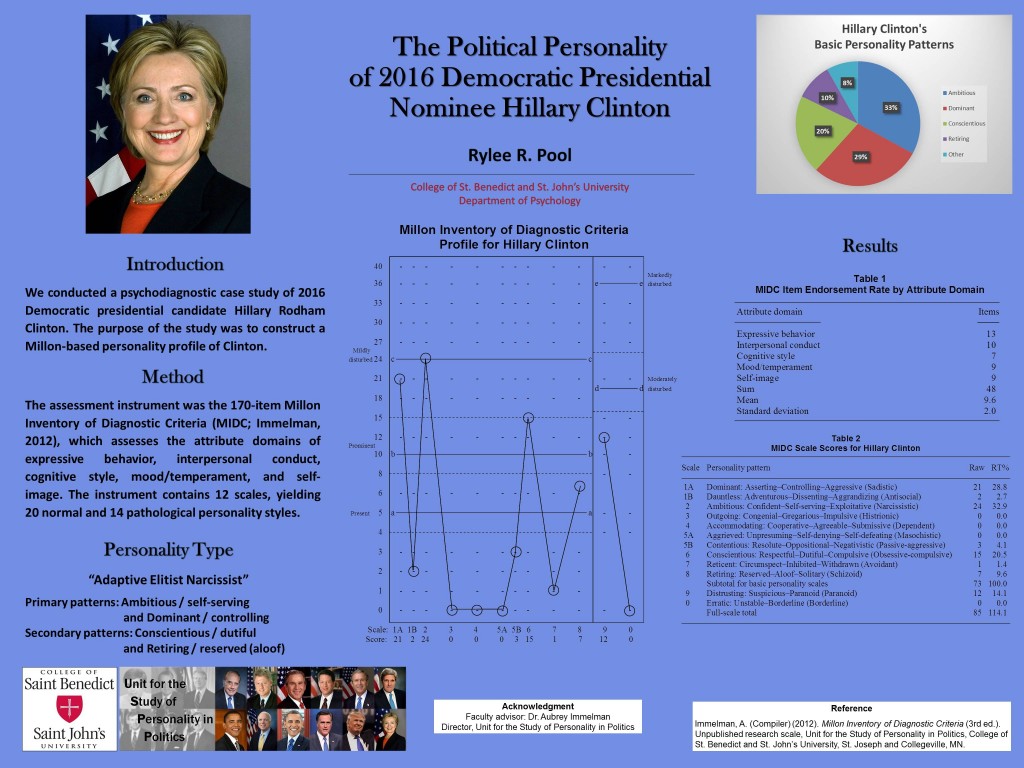
Click on image for larger view
Note: Personal Electability Index (political impact) score
Hillary Clinton scores high on the Millon Inventory of Diagnostic Criteria-based Personal Electability Index, which has accurately predicted the outcome of every presidential election since 1996.
Following are the PEI calculations for Hillary Clinton:
Hillary Clinton: PEI = 27 (Study 3; 2016)
Scale:Â Â Â 1AÂ Â Â 1BÂ Â Â 2Â Â Â 3Â Â Â 4Â Â Â 5AÂ Â Â 5BÂ Â Â 6Â Â Â 7Â Â Â 8
Score: Â 21Â Â Â 2 Â 24Â Â 0 Â Â 0 Â Â Â Â 0Â Â Â Â Â 3 Â Â 15 Â Â 1Â Â 7
Scale: 1A = 21; 2 = 24; 3 = 0; 6 = 15; 8 = 7
[Extraversion (scale 3) = 0] + [Narcissism (scale 2) = 24] + [Dominance (scale 1A) = 21] – [Introversion (scale 8) = 7] – [Conscientiousness (scale 6) = (15 – 4) = 11] = 45 – 18 = 27
Dysfunctionality adjusted
[Extraversion (scale 3) = 0] + [Narcissism (scale 2) = 15] + [Dominance (scale 1A) = 15] – [Introversion (scale 8) = 7] – [Conscientiousness (scale 6) = (15 – 4) = 11] = 30 – 18 = 12
Hillary Clinton: PEI = 39 (Study 2; updated)
Scale:Â Â 1AÂ Â Â 1BÂ Â Â 2Â Â Â 3Â Â Â 4Â Â Â 5AÂ Â Â 5BÂ Â Â 6Â Â Â 7Â Â Â 8
Score:Â 19Â Â Â Â Â 2Â Â 21Â Â 1Â Â Â 0Â Â Â Â 0Â Â Â Â Â 0Â Â Â 6Â Â Â 0Â Â Â 0
[Extraversion (scale 3) = 1] + [Narcissism (scale 2) = 21] + [Dominance (scale 1A) = 19] – [Introversion (scale 8) = 0] – [Conscientiousness (scale 6) = (6 – 4) = 2] = 41 – 2 = 39
Dysfunctionality adjusted
[Extraversion (scale 3) = 1] + [Narcissism (scale 2) = 15] + [Dominance (scale 1A) = 15] – [Introversion (scale 8) = 0] – [Conscientiousness (scale 6) = (6 – 4) = 2] = 31 – 2 = 29
Hillary Clinton: PEI = 23 (Study 1; 2008)
Scale:Â Â 1AÂ Â Â 1BÂ Â Â 2Â Â Â 3Â Â Â 4Â Â Â 5AÂ Â Â 5BÂ Â Â 6Â Â Â 7Â Â Â 8
Score:Â 15Â Â Â Â Â 4Â Â 15Â Â 2Â Â Â 1Â Â Â Â 0Â Â Â Â Â 9Â Â Â 11Â Â 0Â Â Â 2
Clinton: [Extraversion (scale 3) = 2] + [Narcissism (scale 2) = 15] + [Dominance (scale 1A) = 15] – [Introversion (scale 8) = 2] – [Conscientiousness (scale 6) = (11 – 4) = 7] = 32 – 9 = 23
Detailed Psychological Assessments Released (Nov. 4, 2016)
The Unit for the Study of Personality in Politics has released political-psychological assessments of Hillary Clinton and Donald Trump.
Executive Summary: Hillary Clinton
Full text (34 pages)
The Political Personality of 2016 Democratic Presidential Nominee Hillary Clinton (Working paper, Unit for the Study of Personality in Politics, St. John’s University/College of St. Benedict, October 2016)
Executive Summary: Donald J. Trump
Full text (31 pages)
The Political Personality of 2016 Republican Presidential Nominee Donald J. Trump (Working paper, Unit for the Study of Personality in Politics, St. John’s University/College of St. Benedict, October 2016)
Comparison of Hillary Clinton’s and Donald Trump’s Profiles
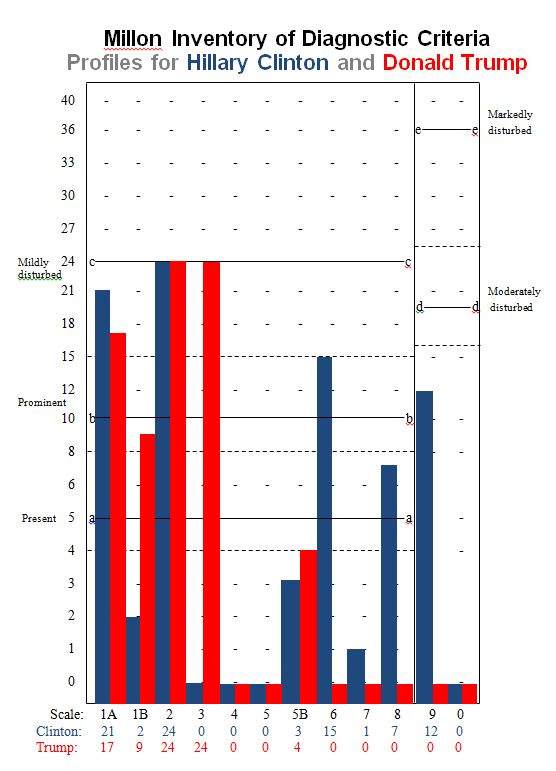
Related reports on this site
Behind the Clinton E-mails: The Psychological Profile of Hillary Rodham Clinton (March 11, 2015)

Click on image for larger view
The Personality Profile of 2016 Republican Presidential Candidate Donald Trump (Aug. 9, 2015)
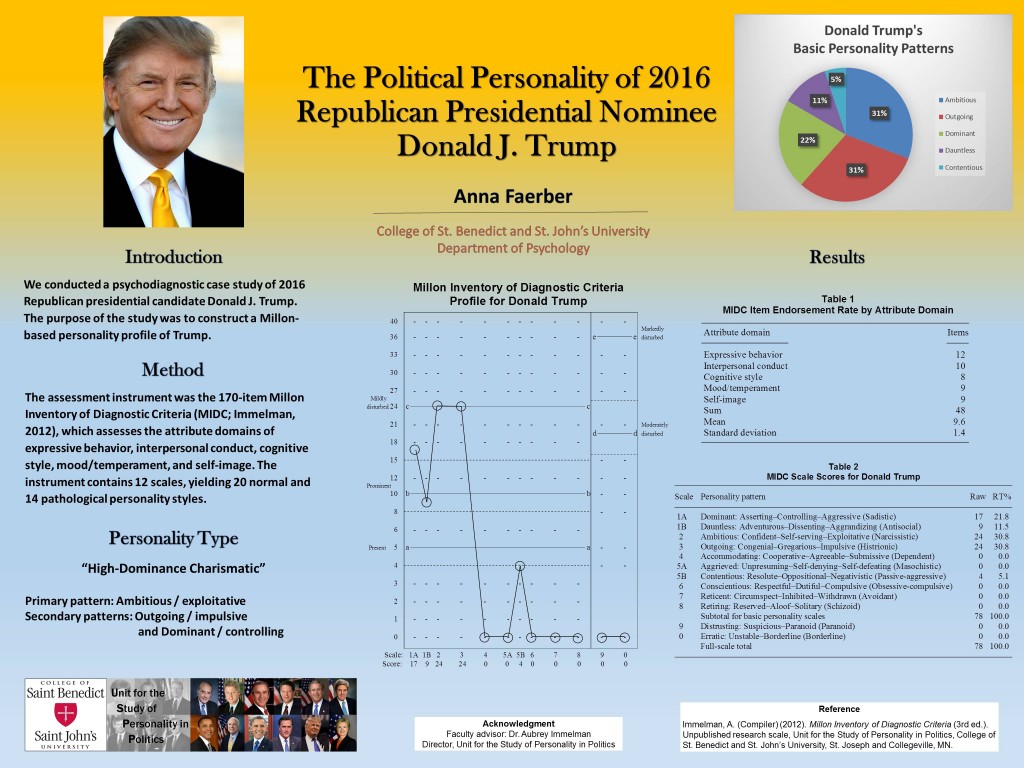
Click on image for larger view
Projecting the Winner of the 2016 Presidential Election: The Personal Electability Index (Feb. 29, 2016)
Donald Trump’s Narcissism Is Not the Main Issue (Aug. 11, 2016)
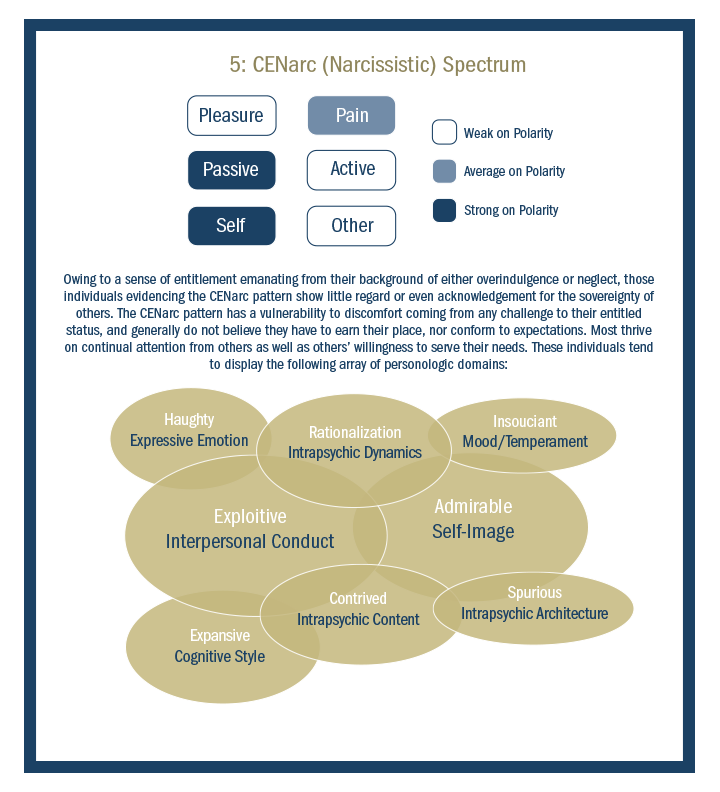
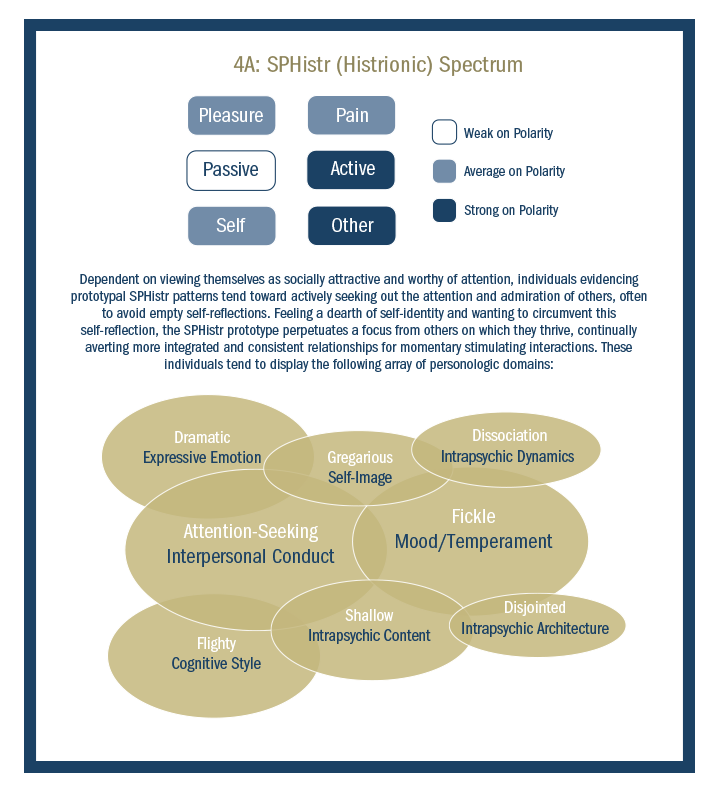
© 2015 MILLON® (Click on images for larger view)
Media reports of political-psychological interest
Hillary Clinton, the Candidate We Know So Well — And Don’t

In this Sunday, April 24, 2016 file photo, Democratic presidential candidate Hillary Clinton speaks during a campaign stop at the University of Bridgeport in Bridgeport, Conn. (Photo: Matt Rourke / AP)
By Jocelyn Noveck
![]()
July 13, 2016
Excerpts
For the last 14 years, and 20 overall, Americans polled by Gallup have named Clinton their most admired woman in the world. But consider some other titles attached to her over the years: Lady Macbeth. Washington insider. Robotic. Wildly ambitious. Congenital liar. (Or Donald Trump’s current favorite, “Crooked Hillary.”) …
“It’s an amazing life,” says biographer Carl Bernstein, who wrote a 600-page book on her and says he still struggles to define her. “You could not make any of this stuff up.” …
[T]he ambition tag has dogged Clinton, 68, throughout her career, as if it were a bad quality rather than a necessity in high-stakes politics. The satirical website The Onion captured the irony in a 2006 headline: “Hillary Clinton Is Too Ambitious To Be The First Female President.”
That gets a knowing laugh from Melanne Verveer, Clinton’s chief of staff from her first lady years.
“If a guy is described as ambitious, it’s a noble attribute — he wants to put himself ahead,” says Verveer. “But if a woman is ambitious, it’s not an attribute, it’s a negative, a pejorative. It’s not proper somehow.”
Former Rep. Patricia Schroeder thinks the ambition factor is — unfairly — key to Clinton’s challenges connecting with the electorate.
“We still don’t like a woman who is showing ambition, especially for that level of a job,” says Schroeder, who famously explored her own presidential candidacy decades ago. “It’s: ‘I’d like her if she weren’t so damned ambitious. How come she wants all that power?'” …
Part of the narrative on Clinton has been her trouble connecting to the public. “I am not a natural politician, in case you haven’t noticed,” she said recently, “like my husband or President Obama.” …
Others note that Clinton has naturally become very guarded, given that she’s been judged, relentlessly and often unfairly, “on a huge stage, for all of her life,” in Bernstein’s words. …
Read the full report at the Associated Press
Clinton on Ballot Tests Voter Views on Gender
By Rylee Pool
St. Cloud Times
August 28, 2016
At 5:39 p.m. [CT] July 26, [2016] history was made in America. Hillary Clinton became the first woman to secure major-party nomination for president of the United States. Although some Americans may not view her nomination as a historic moment for the country, others argue this is a momentous occasion that will go down in history as the next big feminist win.
The women’s rights movement in America gained momentum in the mid-1800s when the first women’s rights convention was held in Seneca Falls, New  York, and one of the main points on the agenda at the convention was women’s suffrage.
From struggling to pass the 19th Amendment to now having a woman’s name on arguably the most important ballot in the world, we’ve come a long way in the last century and a half. Or have we?
Nature or nurture?
Political discourse in the wake of Clinton’s nomination illustrates our country still struggles with gender issues. But is this because we are by nature sexist, or are our brains simply hardwired to be critical of women leaders?
Psychologists specializing in sex differences from a biological perspective would argue the latter — at least to a significant extent. Although gender stereotypes are products of our culture, gender differences are fundamentally rooted in biology, which implies the tendency to view dominant women as overbearing (think “Iron Lady†Margaret Thatcher) but dominant men as strong leaders (think “British Bulldog†Winston Churchill) is hardwired into our brains.
A 2012 study at Texas A&M University illustrates this point. The researchers measured the amount of male sex hormones present in 3-month-olds and then tracked eye movement and duration looking at “male†versus “female†toys. The results? Babies with higher levels of male sex hormones spent more time looking at stereotypically male gendered toys. And all of this research was done on 3-month-olds — before societal pressures could plausibly influence their personal preferences.
But how exactly do sex differences influence how a person is perceived by society? College of St. Benedict and St. John’s University psychology professor Pamela Bacon argues if a woman is cold and uncaring, she tends to be judged more harshly than a man with identical traits because the woman violates the gender stereotype, whereas the man does not.
Psychology and politics
So, what does all of this “psychobabble†have to do with presidential politics? As a Talking Points Memo reader noted recently on the political website, “the kinds of things that leaders do are gendered as male, so we like Joe Biden or Barack Obama for doing them. But when Hillary does them, it’s seen as a violation of gender norms, and so we instinctively don’t like it.â€
Politics is a dog-eat-dog world. Wars are waged, foreign policy is formulated, and economic policies are effected. Being president is not just kissing babies and playing golf; it’s serious business. Americans expect their president to be a strong, confident leader.
Psychologically speaking, strength is an expression of dominance and confidence reflects adaptive narcissism. And who ranks high on dominance and narcissism? Clinton. But so do many participants in the high-stakes game of presidential politics, including Donald Trump.
Personality, leadership
Looking at a candidate’s personality offers a glimpse into their leadership style. Research conducted at CSB/SJU’s Unit for the Study of Personality in Politics reveals Clinton has a personality profile similar to many other high-level leaders. Among the personality traits on which she ranks highest is dominance, similar to politicians such as Rudy Giuliani, Chris Christie and Bob Dole.
Regrettably, as indicated by the gender research cited earlier, male candidates high in dominance are viewed as tough and competent, whereas women who share that quality, like Clinton, are frequently denigrated. Thus, Clinton has been derided with unflattering pejoratives (see, for example “The era of ‘The Bitch’ is coming,†The Atlantic, Aug. 17, 2016). According to prevalent gender stereotypes, women are supposed to be docile and submissive, and those who do not conform are harshly criticized.
Hope or fear ahead?
Although Trump and Clinton are very different in many respects, from their sexes to their resumes to their political ideologies, they have some key qualities in common: their unprecedented unfavorability as major-party nominees and widespread doubt about their character. But if Clinton wins, will her gender inhibit her leadership?
If we look at some of history’s great women leaders, such as Thatcher, Indira Gandhi and Golda Meir, we cannot say their gender rendered them incompetent. But what we can say is that we, as human beings, are naturally hesitant and critical of dominant, ambitious women. Undoubtedly, that will leave Clinton with a steep hill to climb right out of the gate.
This is the opinion of Rylee Pool, Hastings, a senior biology major at the College of St. Benedict and St. John’s University, where she is a summer research fellow in the Unit for the Study of Personality in Politics, directed by Aubrey Immelman.
About this series
This the 10th in an occasional series of personality profiles of candidates in the 2016 presidential election. Rylee Pool is a research assistant in the Unit for the Study of Personality in Politics led by associate professor Aubrey Immelman at St. John’s University/College of St. Benedict. Immelman will elaborate after Labor Day in a commentary about the psychology of Hillary Clinton and her likely leadership style if elected president.
Alternate link to “The Personality Profile of 2016 Democratic Presidential Candidate Hillary Clinton” at Unit for the Study of Personality in Politics website » http://Personality-Politics.org/Hillary-Clinton
Leave a Reply
You must be logged in to post a comment.

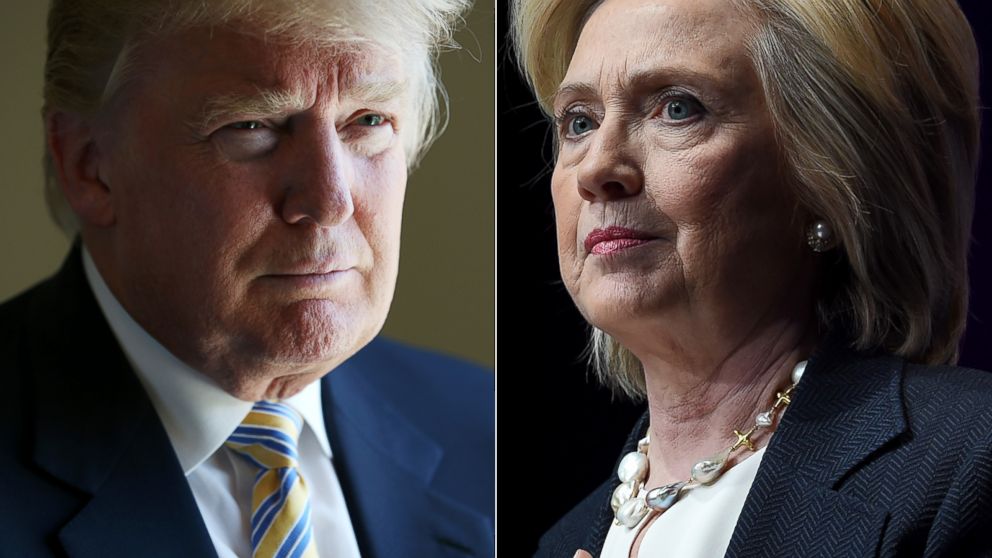


July 27th, 2016 at 9:30 am
[…] The Personality Profile of 2016 Democratic Presidential Candidate Hillary Clinton (July 27, 2016) […]
August 4th, 2016 at 12:33 am
[…] The Personality Profile of 2016 Democratic Presidential Candidate Hillary Clinton (PEI = 27) […]
August 10th, 2016 at 9:53 am
[…] The Personality Profile of 2016 Democratic Presidential Candidate Hillary Clinton […]
August 11th, 2016 at 9:30 am
[…] The Personality Profile of 2016 Democratic Presidential Candidate Hillary Clinton […]
August 11th, 2016 at 12:04 pm
[…] The Personality Profile of 2016 Democratic Presidential Candidate Hillary Clinton […]
August 31st, 2016 at 10:03 am
[…] The Personality Profile of 2016 Democratic Presidential Candidate Hillary Clinton […]
September 26th, 2016 at 8:11 am
[…] The Personality Profile of 2016 Democratic Presidential Candidate Hillary Clinton […]
November 8th, 2016 at 11:49 am
[…] The Personality Profile of 2016 Democratic Presidential Candidate Hillary Clinton […]
November 20th, 2016 at 1:45 pm
[…] The Personality Profile of 2016 Democratic Presidential Candidate Hillary Clinton […]
December 19th, 2016 at 5:37 am
[…] The Personality Profile of 2016 Democratic Presidential Candidate Hillary Clinton (July 27, 2016) […]
June 1st, 2019 at 8:20 am
[…] The Personality Profile of 2016 Democratic Presidential Candidate Hillary Clinton […]
July 1st, 2019 at 7:53 pm
[…] Trump (PEI = 62; 45 corrected score) Hillary Clinton (PEI = 39; 29 corrected score) […]